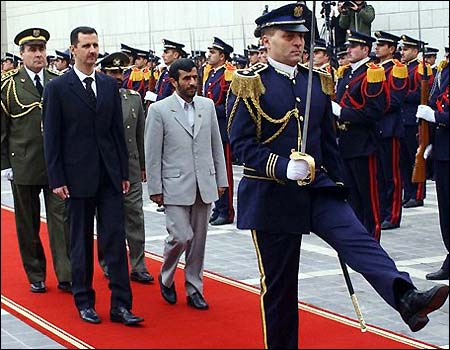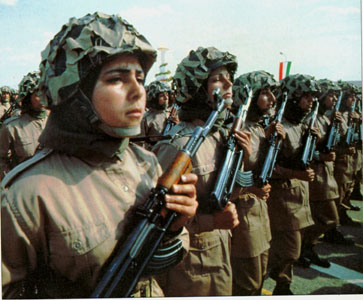
Hundreds of thousands of Iraqi Shiites demonstrate for Lebanon
by Ammar Karim Fri Aug 4, 12:09 PM ET
Hundreds of thousands of Iraqi Shiites thronged the streets of Baghdad chanting "Death to Israel" and "Resistance" in a massive and noisy demonstration of support for Lebanon's Hezbollah militia.
The march was the largest foreign show of support for the Lebanese Shiite guerrillas in the three weeks since Israel launched a devastating ground and air offensive against them. Elsewhere in the country Friday, 33 people died, mostly in the northern province of Nineveh, where insurgent bombers and gunmen killed 19, mostly police officers.
The demonstration passed off largely peacefully and was accompanied by large numbers of black-clad armed fighters from the radical cleric Moqtada al-Sadr's "Mehdi army". But the size and fervour of the rally will raise the temperature in Baghdad, where Sadr's movement has tense relations with the city's Sunni minority, US-led coalition forces and the fragile government of national unity.
The Shiite demonstrators wore white shrouds to demonstrate their willingness to accept martyrdom, marched over US and Israeli flags and waved hundreds of yellow Hezbollah flags in support of the militia's war against Israel. Portraits of the Lebanese Shiite group's leader, Hassan Nasrallah, were carried aloft through a massive crowd which packed a kilometre-long street in the teeming Sadr City district of the Iraqi capital.
"This million-man demonstration is to support the resistance in Lebanon," cleric Hazem al-Aariji told worshippers at Friday prayers before the march. "For 22 days the Israelis could not invade Lebanon ... Hezbollah has terrified the Israelis because they do not fear death," he declared.
The rally lasted for an hour before participants dispersed peacefully. Police reported that a Katyusha rocket was fired at the neighborhood but did not land near the march and left no casualties. Security around Sadr City was especially high with police and army units on the outskirts, while Sadr's militiamen searched bystanders and demonstrators.
"We will win by God's help, the Mehdi Army and Hezbollah," chanted the demonstrators. "We are soldiers, ready for Nasrallah's call." The Israeli bombardment of Lebanon has angered both Sunni and Shiite Iraqis, and preachers across the country brought up the issue in Friday sermons, condemning Arab governments for their meagre response to the campaign.
Tensions were raised before the rally by claims from Sadr's movement that US soldiers had fired on a convoy of protesters as it travelled north to Baghdad through the town of Mahmudiyah on Thursday, wounding 16 of them. But the US military said the soldiers had responded only after one of their watchtowers had come under fire from a passing van and that they had killed two "terrorists" in the subsequent exchange.
Sadr's show of force, feeding on the anger of many Iraqis at the actions of US ally Israel, came as coalition commanders in Iraq have been urging the Iraqi government to move against militias. General John Abizaid, the top US commander for the Middle East, said neighbouring Iran was arming Iraqi death squads, that militias have infiltrated the police and that more US troops are needed to bring Baghdad under control.
A senior coalition official, however, cautioned against treating the Mehdi Army as a monolithic entity, as it is a loosely organized body with only parts actively engaged in violent and illegal activities. "We have to careful that we don't demonize Jaish al-Mehdi, because look at the polls -- Moqtada Sadr himself is an enormously popular figure. Why? Because he is thumbing his nose at the coalition," he said.
Baghdad has been battered by a wave of bomb attacks against police patrols and crowded civilian areas, while gunmen from rival Shiite and Sunni factions carry out nightly killings and lob mortar shells across the city. Last week the Pentagon increased the number of US soldiers in Iraq to around 130,000 by extending the tours of some 3,700 combat troops by an extra 120 days to help quell the sectarian violence in Baghdad.
Meanwhile, violence continued outside the capital. Nine police, including a battalion commander were killed by a explosions in Mosul followed by attacks from insurgents. Ten more bodies were found after the fighting. The police commander for the province said the situation was under control and numerous "Al-Qaeda" insurgents had been killed.
South of Mosul, a suicide car bomber drove his booby-trapped vehicle into a soccer match, killing three policemen and seven civilians. A member of one of the former regime's security services was shot dead Friday morning in the southern city of Amara and a bystander was killed just south of the capital by a roadside bomb targeting a police patrol.
Link: http://news.yahoo.com/s/afp/20060804/ts_afp/iraq_060804154641



















